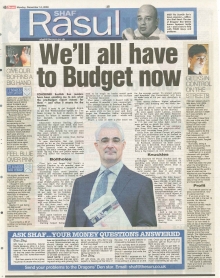CONCERNED Scottish Sun readers have been emailing me to ask what the pre-Budget report means for them – and what it means for the country.
I find it easy to get bogged down in all the Westminster-speak so I’ve been trying to boil it down, in real terms, to what it means in reality for myself, colleagues and for Scotland.
Chancellor Alistair Darling delivered the report last week, and basically had to admit that this is the worst recession for a century.
The economy shrunk by 4.75 per cent this year, which is much worse than anticipated in April.
In fact, it was even worse than during the Great Depression.
It was inevitable that our pockets would be hit as the Government tried to get the economy back on an even keel.
The Treasury tried to make bank-bashing the main message, but this didn’t mask the tax hikes and public sector cuts that will affect the majority of Scottish people.
First, let’s not forget that there’s a General Election in six months’ time, so Darling had to deliver a couple of vote-winner in his report.
Increasing basic state pension and benefits are welcome measures and getting tough on the banks is bound to win a few votes.
But don’t underestimate the great British public. As soon as you claw back the duvet you realise these measures hit us hardest.
The banks were told to pay 50 per cent tax on bonuses over £25,000, so looking at RBS – who were due to pay out £1.5billion – you’d expect the tax on that to be well over £500million.
But the state can’t rely on that figure because a huge number of bankers live outside Britain for tax reasons.
Once again bankers are laughing at us, this time from their tax-friendly boltholes.
Darling hoped being seen to be tough on banks would grab headlines but it doesn’t mask the increase in National Insurance.
That raise – although it doesn’t kick in for another 18 months – was unexpected.
The average income in Scotland has fluctuated recently, but it’s around £26,000.
Someone with this wage is looking at an extra £102 in tax a year and don’t forget the Chancellor,below, announced the same increase last year – which will take effect in 2011.
That’s a total of £200 a year extra tax for the average earner. To protect schools and hospitals, the Government will have to make cuts of 6.4 per cent elsewhere in services.
That means defence, higher education, transport and housing are the likely targets.
Duty on petrol, road tax and alcohol are also likely to make up the shortfall.
So once again under Labour, students will be hit hard and the extra National Insurance may further choke graduates and workers out of a weak jobs arena.
Darling has upped the VAT rate back to 17.5 per cent so what light relief we were getting on goods has gone.
He has also decided to tax company cars from 2012 and our employer-subsidised staff canteens from 2011.
Aside from the Armed Forces, all public sector pay settlements are to be limited to no more than one per cent for two years from 2011. There’s also a cap on contributions made to pensions by employers.
In Scotland, decisions on most public sector pay is devolved. That means teachers, nurses and council workers will not be affected by the changes, but they will have a big impact on civil servants.
The Institute Of Fiscal Studies said the pre-Budget report leaves £15billion in spending cuts which must be made, but Darling hasn’t identified where. That is another electioneering trick.
He’s postponing the bad news when we’d sooner just hear it and decide who’s best placed to run the economy.
Although the hike doesn’t affect those earning less than £20,000, it will dent the top 10 per cent of earners, which as I’ve stated here before, risks moving innovation and entrepreneurship out of Britain’s reach where it ceases to benefit the country.
So more taxes, wage freezes, cuts in services, perks and opportunities for us – the hard-working majority.
And a rap on the gold-plated knuckles of the bankers for getting us into this mess. Nice work, Darling.

